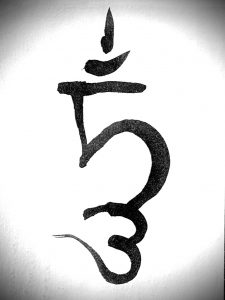Where present proof There absent faith, Two faces to truth.
Undeterminably Predetermined
What without merit avert, The grasping of self subvert, To pureness of view revert.
A Bodhisattava’s Guide to Mediation
By: Shantideva
Chapter 8 “Meditation” herein abridged with editorial subheadings.
H.H The Dalai Lama, “To strengthen our practice, it is necessary to develop one-pointed concentration of the mind…. Lack of concentration prevents us from keeping our minds focused on the object of meditation… In brief, meditation is a way for training and transforming the mind.”
Calm abiding
1: I should place my mind in concentration:
For the person who’s mind is distracted
Dwells between fangs of disturbing conceptions.
2,3: Through solitude of body and mind
No distractions will occur:
I should forsake the worldly life,
And completely discard distorted conceptions.
I should entirely forsake attachments and cravings
For this is the way of the wise.
4: Having understood that disturbing conceptions are completely overcome
By superior insight endowed with calm abiding,
First of all, I should search for calm abiding,
This is achieved through the genuine joy of those unattached to worldly life.
82,83: The objects of desire will certainly perish,
[Wherein enlightenment] is attained
With just one millionth of the difficulty
Involved in continually exhausting myself
For the sake of what is not great.
85: Having in this way developed disillusionment with desire,
Generate joy for solitude.
Devoid of disputes and disturbing conceptions.
87: Having abandoned the pain of clinging and guarding (possessions)
Abide, independent, free of care.
Equanimity (Awaking Mind)
89: Having in such ways as these
Thought about the excellence of solitude,
Completely pacify distorted conceptions
And meditate on the Awaking Mind.
90: Make an effort
To mediate upon the equality between self and others.
Intent on protecting all beings
As all are equal in (wanting) pleasure and (not wanting) pain.
110: Just as one protects themself
From unpleasant things however small,
In the same way act toward others
With a compassionate and caring mind.
120: Thus whoever wishes to quickly afford protection
To both self and other beings
Should practice the holy secret:
The exchanging of self for others.
129: Whatever joy there is in this world
All comes from desiring others to be happy,
And whatever suffering there is in the world
All come from selfish desires.
165: In brief, for the sake of all living creatures,
May all harms
I have selfishly caused to others
Descend upon myself.
Renunciation
178: In the end this body will turn to dust;
Why do I grasp this unbearable
And unclean form as “I”?
184: Therefore, in order to benefit all beings
I shall give up this body without any attachment.
Although it may have many faults,
I should look after it while experiencing (the results of my previous) actions.
186: Just like the compassionate Children of the Conqueror,
I shall patiently accept what I must do;
For if I do not make a constant effort day and night,
When will misery ever come to an end?
187: Therefore, in order to dispel the obstructions,
I shall withdraw my mind from mistaken ways
And constantly place it in equipoise
Upon the perfect object.
Why?
Mantra of inquisitive mind, Midst consequentle bind, Casualty seeks to find. Conscious causal perception, Disillusioned, rooted in deception, Cyclic, without inception.
Insistence
Illusory existence persistence Experientially resistant, Without proof of non-existence. Argument for existence persists Of that which does not exist Absent falsifiable hypothesis.
Gone gentle into
A refrain reframing on reflection of Dylan Thomas’s reaffirmation “Do not go gentle into that good night.”
Go gentle into primordial light. Birth but age and death as night is to day. Sage sits serene, illuminates the night. Who wise in compassion knows what is right, The two truths to the awaking way. Go gentle into that primordial light None can hold time regardless of their might, That from that arisen shall never stay. Sage sits serene, illuminates the night. What use to grieve at setting of sunlight, Why place trust in what is known to betray? Go gentle into that primordial light. Who grasps at what temporal death gives fright. So gently abide, perturbed thoughts allay. Sage sits serene, illuminates the night. To who taught from atop Mount Meru’s height, Guide whom grasp and rage through good night, I pray. So gentle into that primordial light, sage serenely sits, illuminates night.
Samvrtisatya
HUM

HÜM
A Tibetan syllable that symbolizes the nature, attributes, and power of Buddha-mind.
The five parts of the syllable represent the five Transcendent Awarenesses of Buddha-mind:
- awareness of all-perfected emptiness
- mirror-like awareness
- awareness of spontaneously arisen compassion
- finely distinguishing, astute awareness
- awareness of equanimity
Accumulation:
Observation,
Contemplation,
Meditation,
Realization.
Eight Lines To Happiness

True happiness not found
in the objective,
subject to origination
and thus to cessation.
It is subjective
manifestation
of mind reflective
of ultimate objective.


